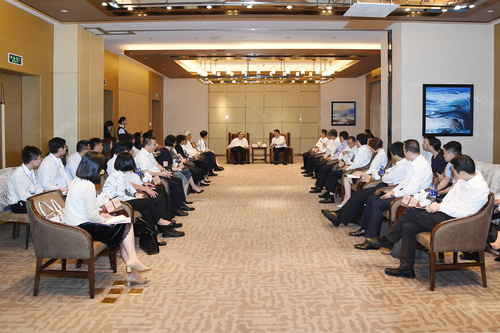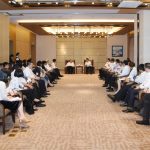 The Chief Executive, Mr Chui Sai On, who is visiting Zhongshan, meets with Mr Jiao Lansheng, Mayor of Zhongshan.
The Chief Executive, Mr Chui Sai On, who is visiting Zhongshan, meets with Mr Jiao Lansheng, Mayor of Zhongshan.
A Macao Special Administrative Region (SAR) Government delegation, led by Chief Executive Mr Chui Sai On, continued on Monday (25 June) a tour of cities within the Guangdong-Hong Kong-Macao Greater Bay Area (Greater Bay Area).
Its first stop of the day was in Zhongshan. to visit the Zhongzhi Pharmaceutical Group Co Ltd and to attend a seminar.
The Mayor of Zhongshan, Mr Jiao Lansheng, accompanied the Chief Executive, the delegation members and representative members of the “Thousand Talents Union” during the visit to Zhongzhi Pharmaceutical Group. The visitors were briefed by the company’s General Manager, Mr Cheng Jinle, about the group's present situation and development plans. The President of Macau University of Science and Technology (MUST), Professor Liu Liang, attended the event, and reported on the work of the State Key Laboratory of Quality Research in Chinese Medicine, which was jointly established by MUST and Zhongzhi Pharmaceutical Group.
During the seminar, the Chief Executive showed great interest in a briefing on the potential for Macao and Zhongshan jointly to establish a cooperative institution for innovative pharmaceutical research and development. He noted that the master plan for the Greater Bay Area would soon be launched, and Macao would actively participate in that plan. Macao and Zhongshan had the chance to enhance cooperation in many fields, especially in exploring new areas for the development of Chinese medicine. The Macao SAR Government attached great importance to making use of Macao’s advantages in scientific research and in its role as a platform, in order to step up efforts in fostering and promoting development of the Traditional Chinese Medicine industry, with the aim of entering the global market via the Traditional Chinese Medicine Science and Technology Industrial Park in Hengqin.
The Mayor, Mr Jiao, mentioned during the seminar that support from within the region, especially the cooperation of Hong Kong and Macao, was critical to Zhongshan’s development of its healthcare and pharmaceutical industries. Zhongshan had already achieved considerable results in biomedicine and healthcare products. The city's authorities were currently formulating a master plan for further development of these industries, and would explore new policies regarding imported pharmaceutical products and clinical trials.
Immediately after the seminar, Mr Chui had a meeting with Mr Jiao. The Chief Executive said many people in Macao had family ties to Zhongshan. Macao residents were especially fond of Zhongshan, and many of them chose either to work, travel, invest or even enjoy their retirement there. The close relationship between the two cities was not merely based on friendship, but also on the principle of cooperation across various areas. He believed that Macao-Zhongshan cooperation would rise to even higher levels after the launch of the Greater Bay Area master plan.
The Mayor, Mr Jiao, said that Zhongshan and Macao continued to deepen cooperation and had been making every effort to promote the “Guangdong-Macao Comprehensive Cooperation Demonstration Zone” initiative. Currently, there were more than 600 well-established Macao companies operating in Zhongshan, and the latter city also welcomed young Macao entrepreneurs to develop their businesses in Zhongshan.
According to Mr Jiao, Zhongshan had allocated 15 square kilometres of land in Cuiheng New District for the development of Zhongshan Science City, as the centre of the “Guangdong-Macao Comprehensive Cooperation Demonstration Zone”. He looked forward to commencing science and technology cooperation projects with universities in Macao, in order to broaden and deepen cooperation between the two places.
Mr Chui agreed that, under the “Framework Agreement on Cooperation between Guangdong and Macao”, Zhongshan and Macao had already engaged in cooperation in various areas, including at tertiary educational level. The State Key Laboratory of Quality Research in Chinese Medicine was an example of a cooperation project developed by a Zhongshan company and a Macao higher education institution. Mr Chui believed that the two cities would in future seize more and better opportunities for cooperation in academic and scientific research.
In the afternoon, the delegation visited another Greater Bay Area city, Jiangmen. Accompanied by the Secretary of the Communist Party of China (CPC) Jiangmen Municipal Committee, Mr Lin Yingwu, the delegation and “Thousand Talents Union” representatives visited the electroplating plant of New Fortune Environmental Co Ltd in Yamen, Jiangmen. There they learned about its environmentally-sustainable operations and heard about ideas within Jiangmen for the development of a Guangdong-Macao (Jiangmen) Industrial Cooperation Demonstration Zone.
While in Jiangmen, Mr Chui also attended a seminar hosted by Mr Lin. The Chief Executive again noted that the master plan for the development of the Greater Bay Area would soon be launched, and said he hoped that Macao and Jiangmen would jointly participate and deepen cooperation in the development of the Greater Bay Area.
Mr Chui stated that Macao and Jiangmen should seize the opportunities for jointly participating in the development of the Greater Bay Area via innovative ideas. Macao continued to strengthen its positioning and functions, utilising its advantages, while fully making use of the wealth of resources provided by returned overseas Chinese in Macao and Jiangmen. This would help to put to good use the talents of Jiangmen people based in Macao, in order to explore new approaches to cooperation and enhance key cooperation projects between the two cities.
Mr Chui also said that Macao and Jiangmen should additionally make use of those advantages unique to each place, in order to develop opportunities in the markets of the Portuguese-speaking countries. The Jiangmen Municipal People’s Government and the city’s industries had long been supporting and participating in Macao’s branded commercial and trade events. The Macao Trade and Investment Promotion Institute (IPIM) had also enabled many Macao enterprises – and those from Portuguese-speaking countries – to seek business opportunities in Jiangmen, thus providing a platform for cooperation and exchanges between industries of Jiangmen, Macao and Portuguese-speaking countries; and additionally creating opportunities for Jiangmen to develop markets for its output in Portuguese-speaking countries.
Moreover, Macao and Jiangmen should jointly promote cooperation in entrepreneurship and employment for young people of the two cities. Mr Chui said governmental policy played an important leadership role, in order to create favourable conditions for young people to explore new horizons and make full use of their talents.
Mr Chui also stated the two cities should continue their cooperation in financial services and environmental protection. Macao and Jiangmen had already signed the “Memorandum for Enhancing Financial Cooperation Between Jiangmen and Macao” and a document called the “Framework Agreement between the Government of the Macao SAR and the Jiangmen Municipal People’s Government regarding Intensified Cooperation on Green Economy in the Guangdong-Macao (Jiangmen) Cooperation Demonstration Zone”. In future, the two cities should seize the opportunities arising from the Greater Bay Area master plan, in order to deepen financial cooperation and explore innovative cooperation in the energy-saving and environmental-protection sectors.
Mr Lin said that Jiangmen and Macao maintained close economic and trade relationships, and had already achieved good results in terms of deepening exchanges and cooperation. He looked forward to the launch of the Greater Bay Area development plan and the operational launch of the Hong Kong-Zhuhai-Macao Bridge, noting that more opportunities for cooperation would be created for Jiangmen and Macao because of these two initiatives.
Mr Lin added that Macao’s active participation and support were critical to the development of Jiangmen. He hoped that Macao would continue supporting Jiangmen, thereby deepening cooperation in economic and trade matters, industry, science and technology, finance and tourism, and jointly boosting Jiangmen-Macao cooperation in terms of its breadth, depth and height.
Macao officials accompanying Mr Chui for the visits included: the Secretary for Administration and Jusice, Ms Chan Hoi Fan; Executive Council spokesperson Mr Leong Heng Teng; Executive Council members Cheang Chi Keong, Ho Sut Heng and Chan Chak Mo; the Chief-of-Office of the Chief Executive's Office, Ms O Lam; the Director of the Government Information Bureau, Mr Chan Chi Ping; the Director of the Policy Research Office, Mr Lao Pun Lap; the Director of the Protocol, Public Relations and External Affairs Office, Ms Lei Ut Mui; the President of Guangdong-Macao Traditional Chinese Medical Science and Technology Industrial Park Development Company Limited, Ms Lu Hong; and the Principal Advisor of the Policy Research Office, Mr Mi Jian.


